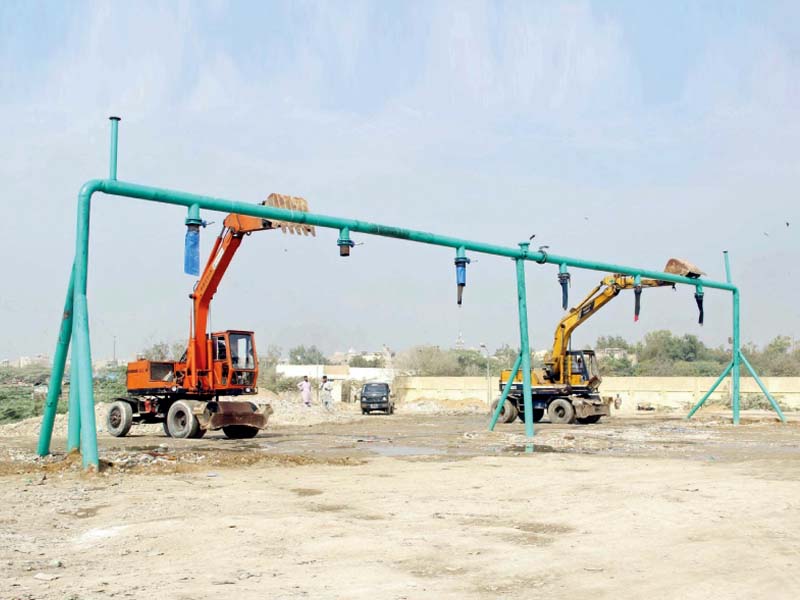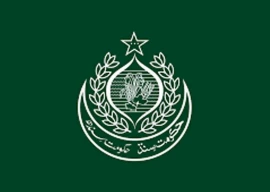
Sindh Chief Minister Syed Murad Ali Shah has directed Karachi Water & Sewerage Board (KWSB) to put in place an effective monitoring system at main source, bulk water supply, trunk and at distribution system so that proper accounting could be made.
"At present, the water board has hypothetical figures of water being received at bulk supply to the distribution system."
This he said while presiding over a meeting of KWSB here at CM House on Sunday. The meeting was attended by provincial ministers - Saeed Ghani, Nasir Shah, Sharjeel Memon, Chief Secretary Sohail Rajput, Chairman P&D Hassan Naqvi, PSCM Fayaz Jatoi, Secretary LG Najam Shah, Special Assistant to CM Waqar Mahdi, Vice chairman KWSB Najmi Alam, Commissioner Karachi Iqbal Memon, former KWSB MD Asadullah Khan, MD Water Board Farida Salam, chief engineers and other concerned.
Secretary Local Government Najam Shah briefing the chief minister said that KWSB
Infrastructure started from Keenjhar Lake to Bulk Water Supply that included GK, K-II, K-III, Dhabeji Pumping House, Pipri, Bulk Supply Conduits & pipes taking water to reservoirs and pumps then it went to main water trunk and then it was being distrusted through a system.
The chief minister asked the water board top officers if they have installed meters at the main source - Keenjhar, the headworks at Gujjo, Pumping station at Dhabeji , Forebay and or at its Filtration plants for K-I & K-II and at COD for K-III. The reply of the water board engineers was in negative. At this the chief minister concluded that it meant the figures of receiving water and line losses or of theft of water were hypothetical.
CM directed the KWSB to start installing meters to gauge the water being taken from Keenjhar, upto distribution system so that accurate figures could be obtained to calculate water being received at the start of the system and losses at the lines.
Shah also directed the water board to prepare a town-wise water distribution plan keeping in view the population of the area. "If a town has more population, it should be given more water than the town having less population," he said.
The CM said that a similar meter system should be established right from Hub source upto its distribution system in District West.
Task Force
The chief minister constituted a task force to conduct operations against illegal connections, illegal hydrants, leakages, wastages. The taskforce would start its operation within the next two days. Local Government Minister Syed Nasir Shah has been made head of the Taskforce and its members include Commissioner Karachi, Additional IG Karachi, CM Special Assistant on CMIT Waqar Mehdi, Vice Chairman KWSB Najmi Alam and concerned deputy commissioners where operation would be conducted. The Taskforce would be given Police, Rangers and other anti-encroachment officials to achieve the task to uproot illegal connections, hydrants and repair the wastages.
The CM also directed KWSB to prepare a Monitoring and Data Logging System. Mapping of areas based on existing demand and supply may also be established with the help of NED University. Alternative design for ample water supply for all the areas based on population demand using hydraulic modeling was the way forward to resolve the water issue of the city. He also directed the water board to develop a GIS based application for water management for KWSB water supply system.
Shah said that there was a need for collection of observed supply data from KWSB for bulk and town level and there should be mapping of Command area of every single Water Table Management (WTM). He also issued directives for acquiring maps for water supply systems for modeling, selection of relevant models for using observed data, using models for evaluation of current situation of water supply and identification of water efficient, water deficient and no water supply areas.
Parched districts get releif
CM Shah taking notice of drinking water shortage in the tail-end districts of the Right Bank of River Indus has directed Irrigation department to immediately release water in the relevant systems so that people and their cattle could drink water.
The chief minister said that people living on the tail-end of the right bank of the river were left running from pillar to post to fetch water.
The chief minister directed Irrigation Minister Jam Khan Shoro to make necessary arrangements to release water in the distributaries of tail-end districts of Thatta, Sujawal, Badin and others so that people and their cattle could drink. At the time of filing this news, the Irrigation Minister confirmed that he had released water in the areas of Thatta and Sujawal and it would further improve by Monday evening.
Shoro told the CM that channels of Sakro Division , District Thatta that were detailed for supplying of water for drinking purpose are as follows: Kotri Minor ( Ghorabari ponds ); Kotri Minor (Sanwalpur ponds); Garho Minor ( Ponds Garho ); Juho Minor ( Ponds Keti Bunder ); Nagwah Minor ( Sakro City ponds ); Sakro Branch ( Ghulamullah city Ponds ); Nari Chach Lower ( Thatta city ); Nari Chach Lower ( Makli city ponds ); and Jam Branch ( Gujjo city ).
In addition to the above major towns, potable water was made available in all channels of Sakro division during the rotation programme of April 25 to May 7, 2022, the Minister Irrigation confirmed.
Published in The Express Tribune, May 9th, 2022.


















COMMENTS
Comments are moderated and generally will be posted if they are on-topic and not abusive.
For more information, please see our Comments FAQ